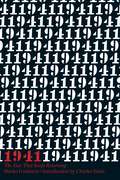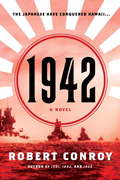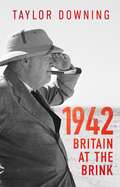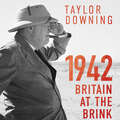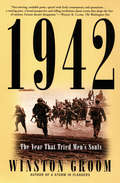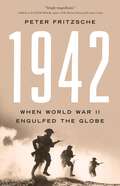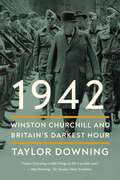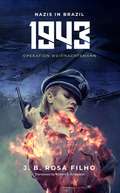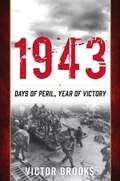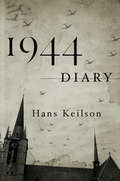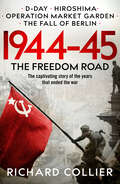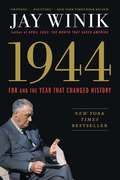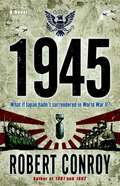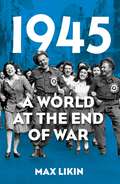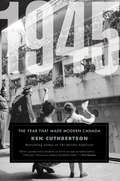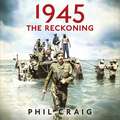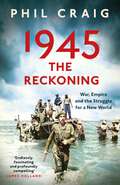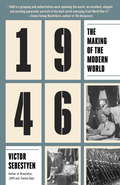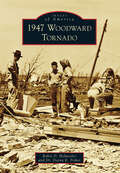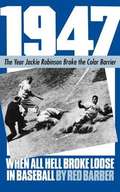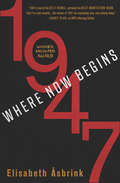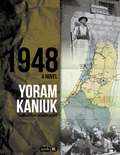- Table View
- List View
1941: The Year That Keeps Returning
by Charles Simic Michael Gable Slavko GoldsteinA New York Review Books OriginalThe distinguished Croatian journalist and publisher Slavko Goldstein says, "Writing this book about my family, I have tried not to separate what happened to us from the fates of many other people and of an entire country." 1941: The Year That Keeps Returning is Goldstein's astonishing historical memoir of that fateful year--when the Ustasha, the pro-fascist nationalists, were brought to power in Croatia by the Nazi occupiers of Yugoslavia. On April 10, when the German troops marched into Zagreb, the Croatian capital, they were greeted as liberators by the Croats. Three days later, Ante Pavelić, the future leader of the Independent State of Croatia, returned from exile in Italy and Goldstein's father, the proprietor of a leftist bookstore in Karlovac--a beautiful old city fifty miles from the capital--was arrested along with other local Serbs, communists, and Yugoslav sympathizers. Goldstein was only thirteen years old, and he would never see his father again. More than fifty years later, Goldstein seeks to piece together the facts of his father's last days. The moving narrative threads stories of family, friends, and other ordinary people who lived through those dark times together with personal memories and an impressive depth of carefully researched historic details. The other central figure in Goldstein's heartrending tale is his mother--a strong, resourceful woman who understands how to act decisively in a time of terror in order to keep her family alive. From 1941 through 1945 some 32,000 Jews, 40,000 Gypsies, and 350,000 Serbs were slaughtered in Croatia. It is a period in history that is often forgotten, purged, or erased from the history books, which makes Goldstein's vivid, carefully balanced account so important for us today--for the same atrocities returned to Croatia and Bosnia in the 1990s. And yet Goldstein's story isn't confined by geographical boundaries as it speaks to the dangers and madness of ethnic hatred all over the world and the urgent need for mutual understanding.
1942: A Novel
by Robert ConroyDecember 7 is "the date which will live in infamy." But now Japan is hatching another, far greater plan to bring America to its knees. . . . The Japanese surprise attack on Pearl Harbor was a resounding success-except for one detail: a second bombing mission, to destroy crucial oil storage facilities, was aborted that day. Now, in this gripping and stunning work of alternate history, Robert Conroy reimagines December 7, 1941, to include the attack the Japanese didn't launch, and what follows is a thrilling tale of war, resistance, sacrifice, and courage. For when Admiral Isoroku Yamamoto sees how badly the United States has been ravaged in a two-pronged strike, he devises another, more daring proposal: an all-out invasion of Hawaii to put a stranglehold on the American Pacific Fleet. Yamamoto's strategy works brilliantly-at first. But a handful of American soldiers and a determined civilian resistance fight back in the face of cruelty unknown in Western warfare. Stateside, a counterassault is planned-and the pioneering MIT-trained aviator Colonel Jimmy Doolittle is given a near-impossible mission with a fleet of seaplanes jury-rigged into bombers. From spies to ordinary heroes and those caught between two cultures at war, this is the epic saga of the Battle of Hawaii-the way it very nearly was. . . .
1942: Britain at the Brink
by Taylor Downing'Taylor Downing vividly brings to life a terrible year' Max Hastings Sunday TimesEighty years ago, Britain stood at the brink of defeat. In 1942, a string of military disasters engulfed Britain in rapid succession : the collapse in Malaya; the biggest surrender in British history at Singapore; the passing of three large German warships through the Straits of Dover in broad daylight; the longest ever retreat through Burma to the gates of India; serious losses to Rommel's forces in North Africa; the siege of Malta and the surrender at Tobruk. All of this occurred against the backdrop of catastrophic sinkings in the Atlantic and the Arctic convoys. People began to claim that Churchill was not up to the job and his leadership was failing badly. Public morale reached a new low. 1942 Britain At the Brink explores the story of frustration and despair in that year prompting the Prime Minister to demand of his army chief 'Have you not got a single general who can win battles?' Using new archival material, historian Taylor Downing shows just how unpopular Churchill became in 1942 with two votes attacking his leadership in the Commons and the emergence of a serious political rival. Most people think that Britain's worst moment of the war was in 1940 when the nation stood up against the threat of German invasion. In 1942 Britain at the Brink, Taylor Downing describes in nail-biting detail what was really Britain's darkest hour .
1942: Britain at the Brink
by Taylor Downing'Taylor Downing vividly brings to life a terrible year' Max Hastings Sunday TimesEighty years ago, Britain stood at the brink of defeat. In 1942, a string of military disasters engulfed Britain in rapid succession : the collapse in Malaya; the biggest surrender in British history at Singapore; the passing of three large German warships through the Straits of Dover in broad daylight; the longest ever retreat through Burma to the gates of India; serious losses to Rommel's forces in North Africa; the siege of Malta and the surrender at Tobruk. All of this occurred against the backdrop of catastrophic sinkings in the Atlantic and the Arctic convoys. People began to claim that Churchill was not up to the job and his leadership was failing badly. Public morale reached a new low. 1942 Britain At the Brink explores the story of frustration and despair in that year prompting the Prime Minister to demand of his army chief 'Have you not got a single general who can win battles?' Using new archival material, historian Taylor Downing shows just how unpopular Churchill became in 1942 with two votes attacking his leadership in the Commons and the emergence of a serious political rival. Most people think that Britain's worst moment of the war was in 1940 when the nation stood up against the threat of German invasion. In 1942 Britain at the Brink, Taylor Downing describes in nail-biting detail what was really Britain's darkest hour .
1942: Britain at the Brink
by Taylor Downing'Taylor Downing vividly brings to life a terrible year' Max Hastings, Sunday Times'Taylor Downing is a wonderful historian and a wonderful history communicator.' Dan Snow, History HitEighty years ago, Britain stood at the brink of defeat. In 1942, a string of military disasters engulfed Britain in rapid succession : the collapse in Malaya; the biggest surrender in British history at Singapore; the passing of three large German warships through the Straits of Dover in broad daylight; the longest ever retreat through Burma to the gates of India; serious losses to Rommel's forces in North Africa; the siege of Malta and the surrender at Tobruk. All of this occurred against the backdrop of catastrophic sinkings in the Atlantic and the Arctic convoys. People began to claim that Churchill was not up to the job and his leadership was failing badly. Public morale reached a new low. 1942 Britain At the Brink explores the story of frustration and despair in that year prompting the Prime Minister to demand of his army chief 'Have you not got a single general who can win battles?' Using new archival material, historian Taylor Downing shows just how unpopular Churchill became in 1942 with two votes attacking his leadership in the Commons and the emergence of a serious political rival. Most people think that Britain's worst moment of the war was in 1940 when the nation stood up against the threat of German invasion. In 1942 Britain at the Brink, Taylor Downing describes in nail-biting detail what was really Britain's darkest hour .
1942: The Year That Tried Men's Souls
by Winston GroomAmerica’s first year in World War II, chronicled in this “page-turner” by the Pulitzer Prize–nominated author of Forrest Gump and The Generals (Publishers Weekly). On December 7, 1941, an unexpected attack on American territory pulled an unprepared country into a terrifying new brand of warfare. To the generation of Americans who lived through it, the Second World War was the defining event of the twentieth century, and the defining moments of that war were played out in the year 1942. This account covers the Allies’ relentless defeats as the Axis overran most of Europe, North Africa, and the Far East. But by midyear the tide began to turn. The United States finally went on the offensive in the Pacific. In the West, the British defeated Rommel’s panzer divisions at El Alamein while the US Army began to push the Germans out of North Africa. By the year’s end, the smell of victory was in the air. 1942, told with Winston Groom’s accomplished storyteller’s eye, allows us into the admirals’ strategy rooms, onto the battlefronts, and into the heart of a nation at war. “When not drawing in readers with the narrative, Groom is impressing them with his masterful analyses.” —The Atlanta Journal-Constitution “Groom has done an artful job of blending the many stories of 1942.” —The Anniston Star
1942: When World War II Engulfed the Globe
by Peter FritzscheA penetrating history of the year World War II became a global conflict and humankind confronted both destruction and deliverance on a planetary scale, &“offering an intriguing perspective on a world at war&” (Richard Overy, New York Times–bestselling author of Blood and Ruins) By the end of the Second World War, more than seventy million people across the globe had been killed, most of them civilians. Cities from Warsaw to Tokyo lay in ruins, and fully half of the world&’s two billion people had been mobilized, enslaved, or displaced. In 1942, historian Peter Fritzsche offers a gripping, ground-level portrait of the decisive year when World War II escalated to global catastrophe. With the United States joining the fight following Japan&’s attack on Pearl Harbor, all the world&’s great powers were at war. The debris of ships sunk by Nazi submarines littered US beaches, Germans marauded in North Africa, and the Japanese swept through the Pacific. Military battles from Singapore to Stalingrad riveted the world. But so, too, did dramas on the war&’s home fronts: battles against colonial overlords, assaults on internal &“enemies,&” massive labor migrations, endless columns of refugees. With an eye for detail and an eye on the big story, Fritzsche takes us from shipyards on San Francisco Bay to townships in Johannesburg to street corners in Calcutta to reveal the moral and existential drama of a people&’s war filled with promise and terror.
1942: Winston Churchill and Britain's Darkest Hour
by Taylor DowningA revelatory new work of popular history focused on the year 1942, as the fate of Britain—and Winston Churchill&’s leadership—hangs in the balance.Eighty years ago, Britain stood at the brink of defeat. In 1942, a string of military disasters engulfed Britain in rapid succession : the collapse in Malaya; the biggest surrender in British history at Singapore; the passing of three large German warships through the Straits of Dover in broad daylight; the longest ever retreat through Burma to the gates of India; serious losses to Rommel's forces in North Africa; the siege of Malta and the surrender at Tobruk. All of this occurred against the backdrop of catastrophic sinkings in the Atlantic and the Arctic convoys. People began to claim that Churchill was not up to the job and his leadership was failing badly. Public morale reached a new low. Taylor Downing&’s 1942 explores the story of frustration and despair of that year, prompting Winston Churchill to demand of his army chief, "Have you not got a single general who can win battles?&” Using newly discovered archival material, historian Taylor Downing shows just how unpopular Churchill became in 1942, with two votes attacking his leadership in the House of Commons and the emergence of a serious political rival.Some argue that Britain's most precarious moment of the war was in 1940—when the nation stood up against the threat of German invasion during the Battle of Britain. But in 1942, Taylor Downing describes, in nail-biting detail, what was really Britain's darkest hour of World War II.
1943 -- Operation Weihnachtsmann: Nazis in Brazil
by Jb Rosa FilhoSuspenseful novel about attempts of Nazi Abwehr agent to subvert Brazil's valiant efforts in support of the Allied war effort during World War Two -- a little known and much neglected theater of that critically important event.
1943: Days of Peril, Year of Victory
by Victor BrooksMilitary historian Victor Brooks argues that the year 1943 marked a significant shift in the World War II balance of power from the Axis to Allied forces. Brooks presents a global narrative of the American experience of war during the year, ranging from the tiny blood-drenched island of Tarawa to the vast expanses of North Africa. At no other period was the course of the war in such precarious balance, the author argues, as both Axis and Allies possessed roughly equivalent power, and as both sides still had reasonable expectations that victory could be achieved.At the beginning of 1943, the tide was slowly turning for the Americans and their allies, Still, the shame of terrible defeats on Bataan and in the Java Sea, at Dieppe and Savo Island were very recent memories. Early on, Americans had high hopes for a massive improvement in the direction of the war; by the end of the year, those hopes were becoming realities. The year 1943 is also the period in which the titans of the war were just emerging. Douglas MacArthur, Dwight Eisenhower, Chester Nimitz, William Halsey, George Patton, Holland Smith and other iconic leaders had begun surfacing as household names in 1943 and would form a nucleus of the command structure that shattered the Axis in 1944 and 1945.In 1943, Brooks presents the history of the year when some of the most exciting and important moments occurred on the road to Allied victory.
1944 Diary
by Damion Searls Hans Keilson[1944 Diary] is a deeply personal account, made even more remarkable that it was written during World War II and the horrors of the Holocaust . . . A moving and fascinating read." —Library JournalIn 2010, FSG published two novels by the German- Jewish writer Hans Keilson: Comedy in a Minor Key—written in 1944 while Keilson was in hiding in the Netherlands, first published in German in 1947, and never before in English—and The Death of the Adversary, begun in 1944 and published in 1959, also in German. With their Chekhovian sympathy for perpetrators and bystanders as well as for victims and resisters, Keilson’s novels were, as Francine Prose said on the front page of The New York Times Book Review, “masterpieces” by “a genius” on her list of “the world’s very greatest writers.” Keilson was one hundred years old, alive and well and able to enjoy his belated fame.1944 Diary, rediscovered among Keilson’s papers shortly after his death, covers nine months he spent in hiding in Delft with members of a Dutch resistance group, having an affair with a younger Jewish woman in hiding a few blocks away and striving to make a moral and artistic life for himself as the war and the Holocaust raged around him. For readers familiar with Keilson’s novels as well as those new to his work, this diary is an incomparable spiritual X-ray of the mind and heart behind the art: a record of survival and creativity in what Keilson called “the most critical year of my life.”Offering further insight into Keilson are the sonnets he wrote for his lover, Hanna Sanders, which appear in translation at the back of this volume.
1944-45: The Freedom Road (Second World War Histories)
by Richard CollierThe end is in sight but the fight is long: the epic and terrifying conclusion to the greatest conflict in history Going into 1944, the Allies knew the tide was turning in their favour. But they still faced a monumental task to get to victory. From the beaches of Normandy on D-Day to those of the Pacific stormed by American marines, from the air drops at Arnhem and the Battle of the Bulge to the final dropping of the atomic bomb on Hiroshima and Nagasaki, from the sacking of Berlin to the delicate peace that followed, this is a gripping and impeccably researched account of two years that forever changed the world. Filled with both the grand sweep of history, and small, unforgettable details and stories of ordinary soldiers, this is military writing of the very highest calibre, perfect for fans of Jonathan Dimbleby and Ben Macintyre.
1944: FDR and the Year That Changed History
by Jay WinikThe year 1944, which determined the outcome of World War II and put intense pressure on the ailing yet determined President Roosevelt, is brought to vivid life in &“gripping&” (The New York Times Book Review) detail in this New York Times bestseller. 1944 was a year that could have stymied the Allies and cemented Hitler&’s waning power. Instead, it saved those democracies—but with a fateful cost. Now, in a &“complex history rendered with great color and sympathy&” (Kirkus Reviews, starred review), Jay Winik captures the epic images and extraordinary history &“with cinematic force&” (Time). 1944 witnessed a series of titanic events: FDR at the pinnacle of his wartime leadership as well as his reelection, the unprecedented D-Day invasion, the liberation of Paris, and the tumultuous conferences that finally shaped the coming peace. But millions of lives were at stake as President Roosevelt learned about Hitler&’s Final Solution. Just as the Allies were landing in Normandy, the Nazis were accelerating the killing of millions of European Jews. Winik shows how escalating pressures fell on an infirm Roosevelt, who faced a momentous decision. Was winning the war the best way to rescue the Jews? Or would it get in the way of defeating Hitler? In a year when even the most audacious undertakings were within the world&’s reach, one challenge—saving Europe&’s Jews—seemed to remain beyond Roosevelt&’s grasp. &“This dramatic account highlights what too often has been glossed over—that as nobly as the Greatest Generation fought under FDR&’s command, America could well have done more to thwart Nazi aggression&” (The Boston Globe). Destined to take its place as one of the great works of World War II, 1944 is the first book to retell these events with moral clarity and a moving appreciation of the extraordinary actions of many extraordinary leaders.
1945: A Novel
by Robert ConroyAmerica has dropped atomic bombs on Hiroshima and Nagasaki.But Japan has only begun to fight. . . .In 1945, history has reached a turning point. A terrible new weapon has been unleashed. Japan has no choice but to surrender. But instead, the unthinkable occurs. With their nation burned and shattered, Japanese fanatics set in motion a horrifying endgame-their aim: to take America down with them. In Robert Conroy's brilliantly imagined epic tale of World War II, Emperor Hirohito's capitulation is hijacked by extremists and a weary United States is forced to invade Japan as a last step in a war that has already cost so many lives. As the Japanese lash out with tactics that no one has ever faced before-from POWs used as human shields to a rain of kamikaze attacks that take out the highest-value target in the Pacific command-the invasion's success is suddenly in doubt. As America's streets erupt in rioting, history will turn on the acts of a few key players from the fiery front lines to the halls of Washington to the shadowy realm of espionage, while a mortally wounded enemy becomes the greatest danger of all.
1945: A World at the End of War
by Max Likin1945 is a fresh look at the last year of the Second World War. Evoking the disorienting strangeness of the end and aftermath of war, it narrates the lives of fifty protagonists caught in the ruins of warfare. The effect is a dazzling kaleidoscope, showing how events affected a wide variety of individuals. From world leaders, artists, writers and musicians to housewives, servicemen and women, concentration camp victims and children, we trace their stories throughout a momentous twelve months. It is a gripping documentary as six years of relentless attrition finally began to come to an end. Written in a fast-moving, impressionistic style, the result is a powerfully evocative and often surprising account, showing how chance and fortune impacted on different people at different times. It will appeal to anyone with an interest in history or military history throughout the world and surprise many with its fascinating juxtapositions of places and people.
1945: The Year That Made Modern Canada
by Ken CuthbertsonIt was a watershed year for Canada and the world. 1945 set Canada on a bold course into the future. A huge sense of relief marked the end of hostilities. Yet there was also fear and uncertainty about the perilous new world that was unfolding in the wake of the American decision to use the atomic bomb to bring the war in the Pacific to a dramatic halt. On the eve of WWII, the Dominion of Canada was a sleepy backwater still struggling to escape the despair of the Great Depression. But the war changed everything. After six long years of conflict, sacrifice and soul-searching, the country emerged onto the world stage as a modern, confident and truly independent nation no longer under the colonial sway of Great Britain. Ken Cuthbertson has written a highly readable narrative that commemorates the seventy-fifth anniversary of the end of WWII and chronicles the events and personalities of a critical year that reshaped Canada. 1945: The Year That Made Modern Canada showcases the stories of people—some celebrated, some ordinary—who left their mark on the nation and helped create the Canada of today. The author profiles an eclectic group of Canadians, including eccentric prime minister Mackenzie King, iconic hockey superstar Rocket Richard, business tycoon E. P. Taylor, Soviet defector Igor Gouzenko, the bandits of the Polka Dot Gang, crusading MP Agnes Macphail, and authors Gabrielle Roy and Hugh MacLennan, among many others. The book also covers topics like the Halifax riots, war brides, the birth of Canada’s beloved social safety net, and the remarkable events that sparked the Cold War. 1945 is the unforgettable story of our nation at the moment of its modern birth.
1945: War, Empire and the Struggle for a New World
by Phil CraigAs the fate of the world is decided, so too is that of the British, Dutch and French empires. In India a generation committed to independence must decide whether to support 'the Raj' or fight alongside the Japanese. One military family is bitterly divided. Will it be the brother who serves under British command, or the one who follows Subhas Chandra Bose and his Indian National Army, who goes on to help build a new and free India? In Borneo a little known Australian special forces campaign - secretly controlled from London - goes horribly wrong as questions are asked about whether its true purpose is military or imperial. And in Indochina and the East Indies British Generals free and arm Japanese prisoners of war and use them in savage campaigns that aim to put colonial rulers back into their palaces.Clearing away the haze of nostalgia, many uncomfortable truths emerge - but so too does a humane and balanced exploration of what victory in the Second World War truly means.
1945: War, Empire and the Struggle for a New World
by Phil CraigAs the fate of the world is decided, so too is that of the British, Dutch and French empires. In India a generation committed to independence must decide whether to support 'the Raj' or fight alongside the Japanese. One military family is bitterly divided. Will it be the brother who serves under British command, or the one who follows Subhas Chandra Bose and his Indian National Army, who goes on to help build a new and free India? In Borneo a little known Australian special forces campaign - secretly controlled from London - goes horribly wrong as questions are asked about whether its true purpose is military or imperial. And in Indochina and the East Indies British Generals free and arm Japanese prisoners of war and use them in savage campaigns that aim to put colonial rulers back into their palaces.Clearing away the haze of nostalgia, many uncomfortable truths emerge - but so too does a humane and balanced exploration of what victory in the Second World War truly means.
1945: War, Empire and the Struggle for a New World
by Phil CraigAs the fate of the world is decided, so too is that of the British, Dutch and French empires. In India a generation committed to independence must decide whether to support 'the Raj' or fight alongside the Japanese. One military family is bitterly divided. Will it be the brother who serves under British command, or the one who follows Subhas Chandra Bose and his Indian National Army, who goes on to help build a new and free India? In Borneo a little known Australian special forces campaign - secretly controlled from London - goes horribly wrong as questions are asked about whether its true purpose is military or imperial. And in Indochina and the East Indies British Generals free and arm Japanese prisoners of war and use them in savage campaigns that aim to put colonial rulers back into their palaces.Clearing away the haze of nostalgia, many uncomfortable truths emerge - but so too does a humane and balanced exploration of what victory in the Second World War truly means.
1946: The Making of the Modern World
by Victor SebestyenFrom the author of Twelve Days: The Story of the 1956 Hungarian Revolution and Revolution 1989: The Fall of the Soviet Empire comes a powerful, revelatory book about the year that would signal the beginning of the Cold War, the end of the British Empire, and the beginning of the rivalry between the United States and the USSR. Victor Sebestyen reveals the events of 1946 by chronologically framing what was taking place in Europe, the Middle East, and Asia, with seminal decisions made by heads of state that would profoundly change the old order forever. Whether it was the July 22 bombing of the King David Hotel in Jerusalem, the July 25 Bikini Atoll underwater atomic bomb test, or the August 16 Great Calcutta Killings in India, 1946 was a year of seismic and dramatic events. Sebestyen begins with the Moscow Foreign Ministers' Conference the week before Christmas 1945, when Stalin announced that the USSR would not withdraw its troops from Iran by March 1946, and ends with the morning of November 3, 1946, when Emperor Hirohito officially unveiled Japan's new constitution before the National Diet. The year 1946 would see the map of Eastern Europe redrawn, Chinese communists gaining decisive victories in their fight for power, and the birth of Israel. Though Truman, Stalin, Churchill, MacArthur, Ben-Gurion, Hirohito, and Menachem Begin are part of the story, Sebestyen also writes about the enormous suffering and ongoing persecution of civilians in the aftermath of the war: the pillaging and rape; the ethnic cleansing of the German population from Czechoslovakia and Poland; the rise of a violent new anti-Semitism; the civil wars in China and Greece; the mass starvation in Japan, Eastern Europe, and Germany on a scale not seen since the Middle Ages; the spread of diseases such as tuberculosis and diphtheria; and such total desolation that schools, government, and transportation were nonexistent and currency was worthless. Drawing on personal testimonies and new archival research, Sebestyen has written a vivid and compelling narrative that brilliantly evokes the beginning of the Cold War set against a devastated landscape of dystopian horrors.(With 16 pages of black-and-white photographs.)From the Hardcover edition.
1947 Ke Zakhma: १९४७ के ज़ख्म
by Rajeev Shuklaवर्ष 1947 में भारत-विभाजन के सात दशक से अधिक बीत जाने पर भी इस पीड़ा से गुजरे लोगों का दिलो-दिमाग आज भी इस दुःख का बोझ उठाए हुए है। नक्शे पर स्याही के बस एक निशान ने एक देश को दो में बाँट दिया, जिसका प्रभाव न केवल एक पीढ़ी पर, बल्कि आने वाली कई पीढि़यों पर भी पड़ा। इससे मिले ज़ख़्म आज भी अंदर तक पीड़ा देते हैं। भारत और पाकिस्तान को बाँटने वाली खौफनाक रेडक्लिफ रेखा के दोनों तरफ के लोगों ने अकल्पनीय त्रासदियों को झेला। लाखों लोगों के विस्थापन के कारण घटी भयानक घटनाएँ इस दुस्वप्न को भोग चुके लोगों की यादों को हमेशा कचोटती रहेंगी। हाँ, बड़े पैमाने पर बरबादी के बावजूद सब खो देने और सबकुछ गँवा बैठने के बीच उत्साहित करने वाली मानवीयता, साहस और दृढ़-संकल्प की कुछ कहानियाँ भी हैं। ये ऐसे लोगों की कहानियाँ हैं, जो प्रधानमंत्री, राष्ट्रपति, उद्योगपति, चिकित्सा-शोधार्थी तथा और भी बहुत-कुछ बने। विभाजन के बाद के दशकों में परिवारों की शून्य से शुरुआत कर फिर से जीवन-निर्माण करने की ये कहानियाँ याद रखने योग्य एवं प्रेरणादायी हैं। इन कहानियों में मनमोहन सिंह और मोहम्मद अली जिन्ना से लेकर गौरी खान की नानी और अवतार नारायण गुजराल तक आते हैं। ‘1947 के ज़ख़्म’ बीते समय की यात्रा का रोमांचक और भावुकतापूर्ण संकलन है। वह अविस्मरणीय समय था, जो दोनों देशों पर हमेशा के लिए निशान छोड़ गया।
1947 Woodward Tornado (Images of America)
by Robin D. Hohweiler Dr. Deena FisherThe 1947 Woodward Tornado remains the deadliest tornado in Oklahoma history, leaving more than 100 people dead and nearly 1,000 seriously injured. The tornado struck the city of Woodward under cover of darkness and without warning at 8:42 p.m. on April 9, 1947. The storm left in its wake hundreds of stories of tragic loss, devastation, and even mysteries that remain unsolved. These include the three unidentified girls--one as young as six months--whose bodies have remained unclaimed, as well as the mystery of what happened to Joan Gay Croft, a girl who disappeared from the local hospital on the night of the storm. Croft's disappearance was featured in an episode of the television show Unsolved Mysteries in the early 1990s. There is also the oft-overlooked story of those who took up residence (some for more than a year) in "Tornado Town" west of the city and found some glimmer of hope in an otherwise hopeless situation.
1947: When All Hell Broke Loose in Baseball
by Red BarberThis is a great baseball story and an even better one about a crucial moment in American history. When Jackie Robinson was penciled into the lineup for the Brooklyn Dodgers in 1947, America's national pastime and America's future changed forever. How much is reflected in a remark Martin Luther King, Jr. made to Don Newcombe: "You'll never know what you and Jackie and Roy did to make it possible to do my job." Red Barber was perfectly situated to observe this drama. Broadcaster for the Dodgers, friend of Branch Rickey who confided in him before and during the year of decision, and keen student of the game and the behavior of its players, Red held the microphone as the story unfolded with a cast of characters that included baseball immortals Duke Snyder, Leo Durocher, Pee Wee Reese, Pete Reiser, Larry McPhail and Joe DiMaggio. Towering above them all are Jackie Robinson and Branch Rickey, who together made baseball and American history and whose courage and toughness Red Barber captures so beautifully in this book.
1947: Where Now Begins
by Fiona Graham Elisabeth ÅsbrinkAn award-winning writer captures a year that defined the modern world, intertwining historical events around the globe with key moments from her personal history.The year 1947 marks a turning point in the twentieth century. Peace with Germany becomes a tool to fortify the West against the threats of the Cold War. The CIA is created, Israel is about to be born, Simone de Beauvoir experiences the love of her life, an ill George Orwell is writing his last book, and Christian Dior creates the hyper-feminine New Look as women are forced out of jobs and back into the home. In the midst of it all, a ten-year-old Hungarian-Jewish boy resides in a refugee camp for children of parents murdered by the Nazis. This year he has to make the decision of a lifetime, one that will determine his own fate and that of his daughter yet to be born, Elisabeth.
1948
by Yoram Kaniuk Anthony BerrisSixty years after fighting in Israel's War of Independence, Yoram Kaniuk tries to remember what exactly did--and did not--happen in his time as a teenage soldier in the Palmach. The result is a touchingly poignant and hauntingly beautiful memoir that the author himself considers a work of fiction, for what is memory but one's own story about the past? Eschewing self-righteousness in favor of self-criticism, Kaniuk's book, winner of the 2010 Sapir Prize for Literature, is the tale of a younger man told by his older, wiser self--the self who realizes that wars are pointless, and that he and his friends, young men from good homes forming an offbeat band of brothers, were senseless to see glory in the prospect of dying young. But it is also a painful, shocking, and tragically relevant homage to the importance of bearing witness to the follies of the past, even--or especially--when they are one's own.
